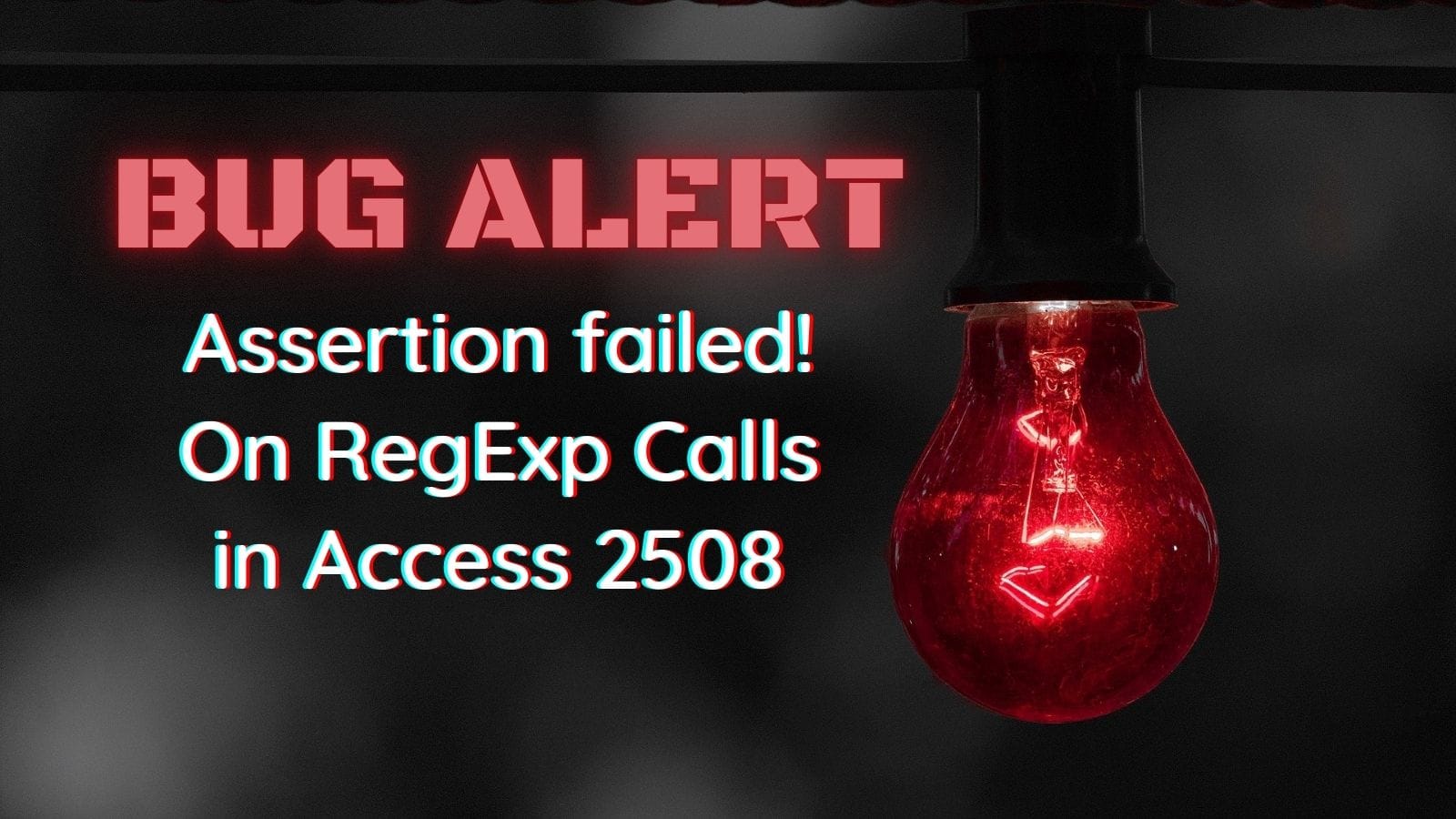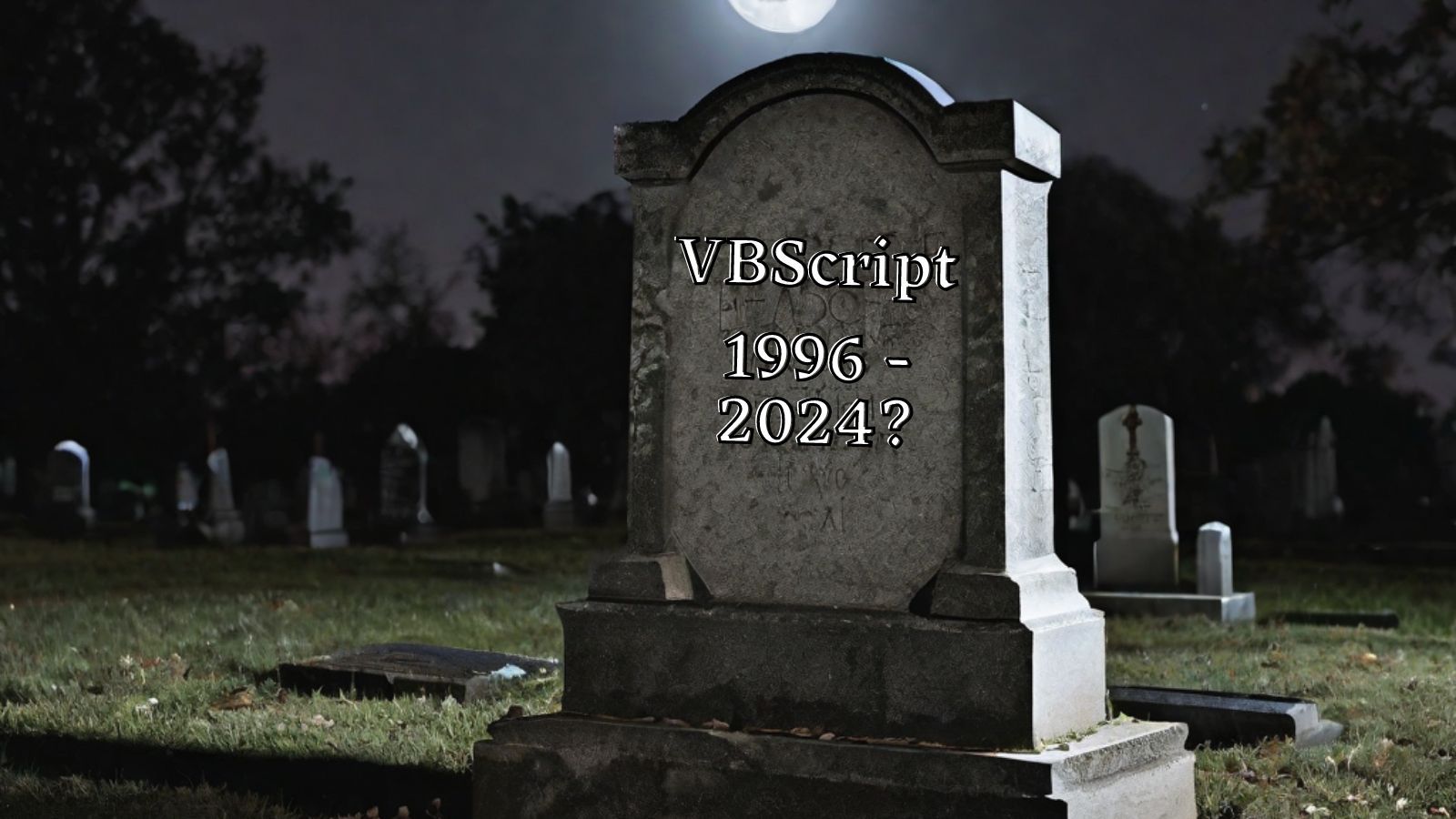Bug Alert: Assertion Failed on RegExp Calls in Access 2508
Two separate sightings of the same error on two entirely different machines within hours of each other is likely no coincidence. I hope this doesn't ruin my long weekend...

Quick post to get this out in the wild and see if anyone else is having similar issues.
I started getting the following error just a couple of hours ago (about 1 PM EDT on 29 Aug 2025):

The error was first reported by a customer who was getting it in one of our deployed applications. This is calling code that has not been touched in years.

Another computer with the same application at the same client did not receive the error. Key difference between the two computers? Their Access versions.
- BAD: Access version 2508: this computer got the error shown above
- GOOD: Access version 2507: no error message;
RE.Replace()works as normal
I checked the Office update history on the computer, but that just takes you to the following website: Release notes for Current Channel.

Here's the text of the website at the time of publication:

I told my customer to wait until after the long weekend to give Microsoft a chance to fix the problem, as his was the only complaint I had received.
And then a few hours later, I fired up a different Access application on a different machine (my dev machine) and got the same unhappy error message on the same lines of code:

Microsoft Visual C++ Runtime Library
Assertion failed!
Program: ...
File: g:\vba\src\65_VC8\VBA\rt\rtre.cxx
Line: 946
Expression:replaceVar.vt == VT_BSTR
For information on how your program can cause an assertion
failure, see the Visual C++ documentation on asserts
(Press Retry to debug the application - JIT must be enabled)
I worry that this may be related to Microsoft's plans to kill off VBScript, which is the library that provides RegEx support in VBA:

I should note that VBScript itself is working just fine on my computer (running Win 11). It has not even switched over to a Feature On Demand (yet). So maybe I'm just being paranoid.
My fear, if this doesn't get resolved quickly, is that I will need to reimplement all of my VBA regex functionality using some other alternative on a much shorter timeline than I anticipated. This is probably where I would start:
Let's hope it doesn't come to that...at least not yet.
Verified Workaround
UPDATE [2025-08-29 23:10 EDT]: I found the following Reddit thread, which describes the behavior I observed earlier today:
Office 365 16.0.19127.20154 - Bug or Deprecation?
by u/Mindflux in MSAccess
Buried in that thread is the following observation:
Comment
by u/Mindflux from discussion
in MSAccess
The relevant part is this line, "Our fix was using cStr on the replacement string when using it in RegEx.Replace."
However, the full explanation didn't quite make sense to me. In my code, the ReplacePattern variable I was passing was already declared as a String. So these last lines, "My guess is that for some reason the empty string was interpreted as a variant instead of a string causing the error. Using cStr makes sure that BStr is used as the data type which prevents the error," did not explain what I was seeing.
I wondered whether the real reason CStr() worked is because it had the side effect of forcing the replace pattern parameter to be passed by value to the .Replace() method. I tried simply wrapping the replace pattern variable in parentheses–which also forces the argument to be passed by value–and that also fixed the problem.
BOTTOM LINE: Wrap the second argument to the RegExp Replace() method in parentheses, and the Visual C++ assertion error goes away:

Now, with a bit of luck, the Office team will roll back whatever caused this problem via their opaque (but handy!) feature gates system before I have to add this bit of workaround code to literally dozens of active Access applications. 😬
Reproducible Example Code
UPDATE [2025-09-08 23:50 EDT]:
The following VBA sample code will reproduce the error in any Office application running v2508 (Access, Excel, Word, Outlook, etc.):
Sub DemoRegExpBug()
Const SearchPattern As String = "ichael"
Const ReplacePattern As String = "ike"
Dim RE As Object: Set RE = CreateObject("vbscript.regexp")
RE.Pattern = SearchPattern
Dim s As String: s = ReplacePattern
Debug.Print "GOOD: " & RE.Replace("Michael", (s))
MsgBox "The next line (without parentheses around the `s` argument) will show the Visual C++ message in Office v2508."
Debug.Print "BAD: " & RE.Replace("Michael", s)
End Sub
I reported the above sample code to the Access development team on August 29, 2025. However, being that this is a VBA issue–and is not specific to Access–I don't think they are responsible for the bug or the fix. I've asked them to pass the issue along to whoever is responsible for the generic VBA codebase. I have not gotten confirmation that that has happened yet.

